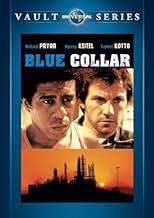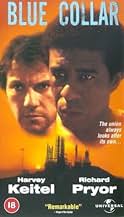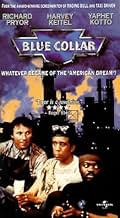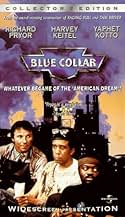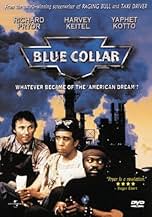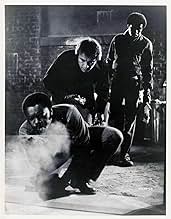PUNTUACIÓN EN IMDb
7,5/10
12 mil
TU PUNTUACIÓN
Cuando tres trabajadores intentan robarle al sindicato local, descubren la corrupción del sindicato y deciden chantajearlos.Cuando tres trabajadores intentan robarle al sindicato local, descubren la corrupción del sindicato y deciden chantajearlos.Cuando tres trabajadores intentan robarle al sindicato local, descubren la corrupción del sindicato y deciden chantajearlos.
- Dirección
- Guión
- Reparto principal
- Premios
- 1 premio y 2 nominaciones en total
Reseñas destacadas
"Blue Collar" opens with a masterful title sequence which introduces us, quickly and effectively, to the harsh world our characters reside in and to the nature of the conditions in the factory they work in. The opening sequence is set to Jack Nitzsche's "Hard Workin' Man", introducing blues music to us right off the bat, music that not only makes up basically all of the music in this film but can be seen as a motif or even a character in the film.
It's amazing how confident and mature Paul Schrader is as a director at this point. Of course, Schrader had already written the massively acclaimed "Taxi Driver" by 1978, but contrary to what one might expect it's his confident and sure handling of the pace and mood in "Blue Collar" that is truly the highlight of the film, not the screenplay penned by Paul and Leonard Schrader, granted the screenplay is in itself quite terrific. Schrader is already a mature director who understands the rhythm of a film.
Going back to the use of music in this film, it isn't so much the score itself by Jack Nitzsche (which is, don't get me wrong, solid blues) that's impressive, it's Schrader's handling of the music and sound in general in this film that makes it work so well. First off, the choice to go with a blues score is inspired in itself, as the nature of the music so perfectly captures what these characters are going through. In addition, the score is most noticeable during scenes where the film appears to be commenting on the futility of the characters' struggle and the misery of what they're going through. Where many films would use music to 'enhance' big, dramatic scenes, Schrader's "Blue Collar" makes the wise decision to use it during low-key scenes. There are several scenes that don't feature any music at all, these being some of the more important scenes. Note the scene where Smokey gets trapped in the paint room, absolutely no music, just the cold sound of the machinery (expertly mixed, might I add), which is far creepier and more effective than any score could be at that point. Similar use of sound occurs a few minutes before the end when Harvey Keitel's character Jerry is being chased.
The acting here is uniformly superb with Keitel possibly giving his best performance (or at least one of them), and Richard Pryor offering what must be recognized as one of the finest performances of the 70's by anyone. Really, who knew Pryor had this sort of skill when it comes to dramatic acting? Yapphet Koto, a beloved character actor, does a fine job in rounding out the cast for the main three characters. Again, Schrader must be credited for directing his actors so well. It's well-known, of course, that the three leads hated each other and actually broke out in fistfights between takes on occasion. Perhaps that created a sort of demented chemistry between them.
The screenplay by Schrader and Schrader (Paul and Leonard) is a fine, fine piece of writing, sort of the daytime factory-worker version of the crude-yet-poetic "Taxi Driver" screenplay. Oddly enough, it's also the source of the few major flaws in this film, as it can come across as fairly heavy-handed in certain scenes. If there's one thing I'd definitely do differently with this film, it's the final shot, which would have been terrific had this been a comedy.
All in all, a great film in its own right and especially impressive as a directorial debut from Schrader. Very memorable.
9/10
It's amazing how confident and mature Paul Schrader is as a director at this point. Of course, Schrader had already written the massively acclaimed "Taxi Driver" by 1978, but contrary to what one might expect it's his confident and sure handling of the pace and mood in "Blue Collar" that is truly the highlight of the film, not the screenplay penned by Paul and Leonard Schrader, granted the screenplay is in itself quite terrific. Schrader is already a mature director who understands the rhythm of a film.
Going back to the use of music in this film, it isn't so much the score itself by Jack Nitzsche (which is, don't get me wrong, solid blues) that's impressive, it's Schrader's handling of the music and sound in general in this film that makes it work so well. First off, the choice to go with a blues score is inspired in itself, as the nature of the music so perfectly captures what these characters are going through. In addition, the score is most noticeable during scenes where the film appears to be commenting on the futility of the characters' struggle and the misery of what they're going through. Where many films would use music to 'enhance' big, dramatic scenes, Schrader's "Blue Collar" makes the wise decision to use it during low-key scenes. There are several scenes that don't feature any music at all, these being some of the more important scenes. Note the scene where Smokey gets trapped in the paint room, absolutely no music, just the cold sound of the machinery (expertly mixed, might I add), which is far creepier and more effective than any score could be at that point. Similar use of sound occurs a few minutes before the end when Harvey Keitel's character Jerry is being chased.
The acting here is uniformly superb with Keitel possibly giving his best performance (or at least one of them), and Richard Pryor offering what must be recognized as one of the finest performances of the 70's by anyone. Really, who knew Pryor had this sort of skill when it comes to dramatic acting? Yapphet Koto, a beloved character actor, does a fine job in rounding out the cast for the main three characters. Again, Schrader must be credited for directing his actors so well. It's well-known, of course, that the three leads hated each other and actually broke out in fistfights between takes on occasion. Perhaps that created a sort of demented chemistry between them.
The screenplay by Schrader and Schrader (Paul and Leonard) is a fine, fine piece of writing, sort of the daytime factory-worker version of the crude-yet-poetic "Taxi Driver" screenplay. Oddly enough, it's also the source of the few major flaws in this film, as it can come across as fairly heavy-handed in certain scenes. If there's one thing I'd definitely do differently with this film, it's the final shot, which would have been terrific had this been a comedy.
All in all, a great film in its own right and especially impressive as a directorial debut from Schrader. Very memorable.
9/10
7tavm
Richard Pryor, Harvey Keitel, and Yaphet Kotto give compelling performances in the drama Blue Collar
After years of reading about this Paul Schrader drama, I finally watched Blue Collar on Netflix Streaming. It stars Richard Pryor, Harvey Keitel, and Yaphet Kotto as three auto assembly workers who feel let down by their bosses and the union rep they don't trust. While Pryor does have some comic moments, he's allowed to be more serious when the film takes a route that challenges these three friends' loyalty to each other. Keitel and Kotto are also very compelling especially when the story concerns the latter's fate. And the score by Jack Nitzsche and Ry Cooder really pours the blues on. So on that note, I recommend Blue Collar. By the way, having noticed that the movie is produced by Norman Lear's company of T.A.T. Communications, he certainly wasn't above plugging his shows "The Jeffersons" and "Good Times" by putting some long clips in when the characters are watching television!
Paul Schrader is often overshadowed by his more famous collaborator Martin Scorsese, which is a shame, because despite Schrader's own movies being wildly uneven, when they are good they are very good indeed. 'Blue Collar' is one of his very best works. A funny, sad and powerful look at three working class guys in a Detroit car factory, it is one of the last Hollywood movies to seriously look at your average working joe and the problems he faces on a daily basis. The three leads are all wonderful, and despite rumoured off screen problems, show a lot of genuine rapport and comaraderie. Harvey Keitel ('Mean Streets', 'Bad Lieutenant') is one of the finest actors of his generation, and Yaphet Koto ('Alien', 'Live And Let Die') is a well respected character actor, but the revelation here is funny man Richard Pryor ('Silver Streak') who displays a depth of talent few would have thought him capable of. The three buddies are joined by a first class supporting cast including Lane Smith ('Over The Edge'), Cliff De Young ('The Hunger') and George Memmoli ('The Phantom Of The Paradise'). Also keep an eye out for a brief cameo by future 'Repo Man' star Tracey Walter, who Schrader also used in a bit part in his next movie 'Hardcore'. 'Blue Collar' is a fine movie, one of the most underrated of the 1970s, and still relevant and powerful twenty five years later. Don't miss it.
Paul Schrader's Blue Collar paints a depressing picture of the American blue collar worker - one Karl Marx would've simply shook his head at and scoff at in disgust. It shows a group of relatable individuals, all of whom slumming their lives away at a dead end, blue collar job, knowing all too well that they're expendable employees, when one particular member of the labor union is so unsatisfied with the lack of productivity on part of his union bosses that he challenges the incumbent to run for union boss. He believes that, if elected, he'd work for the people rather than having the people voice demands that ostensibly appear to fall on deaf ears. It isn't until he inches closer and closer to this potential gig that he realizes just what he's up against, the hoops he'll have to jump through, and the soul of his he'll have to sell in order as a price that comes with that kind of title.
The optimistic soul is Zeke Brown (Richard Pryor), who works alongside his two best friends Jerry Bartowski (Harvey Keitel) and Smokey James (Yaphet Kotto). A great deal of Zeke's motivation to run for union boss comes when a tax collector comes to his house to collect unpaid taxes. In a bout of rage and frustration I'm sure many of us have felt, Zeke rants at the blameless tax collector by saying he barely makes enough money to buy food for his home, let alone keep the electricity running. He follows up by asking why he can't get a break when the same tax collectors give countless breaks to those on Wall Street. Zeke's rant is one of the defining scenes of this film, for it tackles a problem that, even over thirty years following this film's release, is a constant, every-day problem and insurmountable battle for a great deal of families.
Zeke, Jerry, and Smokey decide to find a way to rob the union headquarters. However, upon executing their plan, they discover the union boss doesn't lie when he says that the union is low on cash, for they find very little money. The trio then stumble upon a ledger that contains information about illegal loans that reveal mob connections. Now the men know what it's like to be plunged into a world of crime and uncertainty, with their lives at risk and their optimism for their careers turned into a bitter, backstabbing game of survival of the fittest in a capitalist nightmare.
There's a sadness that lurks in many American crime dramas and that sadness usually stems from the fact that something that should benefit people, or, at the very least, give them something to believe in, doesn't actually operate the way people think it does. Martin Scorsese's Casino showed us the brutal interworkings of a Las Vegas casino that was rigged to make the consumer lose at all cost, and make the soul pay a hefty price had they tried to beat the odds, and a movie like Oldboy shows the real ugliness of people in a crowded, tight-knit area that would lead you to believe people would be brought together or at least unified on a collective term. Blue Collar, however, cuts deeper. These are blue collar jobs we're looking at with this film; not clean-cut white collar jobs and not a rare case of fraud or backhanded dealings in one company. These kinds of manipulating tactics used amongst big business are an unfortunately common practice and Schrader exposes it in a startling manner.
Schrader uses his exposure by getting Richard Pryor the leading role in a film that only manages to be funny when Pryor's character shows off his brazen attitude, which is very infrequent. Here, Pryor goes from the easily recognizable funny-man many of us know him as to a frighteningly hungry character, be it hungry for truth, or eventually, hungry for manipulation and winning. He commands the screen, even when assisted by the likes of Kotto and Keitel. This is his film through and through, a film where his formerly basic color palette of an actors transcends any kind of pre-conceived notions or judgment and shine bright and really show audiences his capabilities as a well-rounded character actor.
Blue Collar is an ugly film, thematically and in terms of the situations its characters are forced into. It shows personal economic freedom and progress as a neverending cycle that results in nothing but further inequality and disenfranchisement from a country that allegedly fights against it. If a film like this came out in present time it would be a strong social statement, but its 1978 release date shows that little has changed in present time when it comes to the dealings of big business.
Starring: Richard Pryor, Harvey Keitel, and Yaphet Kotto. Directed by: Paul Schrader.
The optimistic soul is Zeke Brown (Richard Pryor), who works alongside his two best friends Jerry Bartowski (Harvey Keitel) and Smokey James (Yaphet Kotto). A great deal of Zeke's motivation to run for union boss comes when a tax collector comes to his house to collect unpaid taxes. In a bout of rage and frustration I'm sure many of us have felt, Zeke rants at the blameless tax collector by saying he barely makes enough money to buy food for his home, let alone keep the electricity running. He follows up by asking why he can't get a break when the same tax collectors give countless breaks to those on Wall Street. Zeke's rant is one of the defining scenes of this film, for it tackles a problem that, even over thirty years following this film's release, is a constant, every-day problem and insurmountable battle for a great deal of families.
Zeke, Jerry, and Smokey decide to find a way to rob the union headquarters. However, upon executing their plan, they discover the union boss doesn't lie when he says that the union is low on cash, for they find very little money. The trio then stumble upon a ledger that contains information about illegal loans that reveal mob connections. Now the men know what it's like to be plunged into a world of crime and uncertainty, with their lives at risk and their optimism for their careers turned into a bitter, backstabbing game of survival of the fittest in a capitalist nightmare.
There's a sadness that lurks in many American crime dramas and that sadness usually stems from the fact that something that should benefit people, or, at the very least, give them something to believe in, doesn't actually operate the way people think it does. Martin Scorsese's Casino showed us the brutal interworkings of a Las Vegas casino that was rigged to make the consumer lose at all cost, and make the soul pay a hefty price had they tried to beat the odds, and a movie like Oldboy shows the real ugliness of people in a crowded, tight-knit area that would lead you to believe people would be brought together or at least unified on a collective term. Blue Collar, however, cuts deeper. These are blue collar jobs we're looking at with this film; not clean-cut white collar jobs and not a rare case of fraud or backhanded dealings in one company. These kinds of manipulating tactics used amongst big business are an unfortunately common practice and Schrader exposes it in a startling manner.
Schrader uses his exposure by getting Richard Pryor the leading role in a film that only manages to be funny when Pryor's character shows off his brazen attitude, which is very infrequent. Here, Pryor goes from the easily recognizable funny-man many of us know him as to a frighteningly hungry character, be it hungry for truth, or eventually, hungry for manipulation and winning. He commands the screen, even when assisted by the likes of Kotto and Keitel. This is his film through and through, a film where his formerly basic color palette of an actors transcends any kind of pre-conceived notions or judgment and shine bright and really show audiences his capabilities as a well-rounded character actor.
Blue Collar is an ugly film, thematically and in terms of the situations its characters are forced into. It shows personal economic freedom and progress as a neverending cycle that results in nothing but further inequality and disenfranchisement from a country that allegedly fights against it. If a film like this came out in present time it would be a strong social statement, but its 1978 release date shows that little has changed in present time when it comes to the dealings of big business.
Starring: Richard Pryor, Harvey Keitel, and Yaphet Kotto. Directed by: Paul Schrader.
Excellent urban drama depicting the lives of three friends who work at a car plant, and plan revenge on their boss. Pryor is great in the lead role, which is probably his best performance in a movie. Schrader does a fine job in his directorial debut and makes this film a pure enjoyment. Bravo for Keitel and Kotto in their supporting roles. A highly underrated film that deserves much better than it got.
4 out of 5
4 out of 5
¿Sabías que...?
- CuriosidadesIt was a very tense shoot, because Richard Pryor, Yaphet Kotto, and Harvey Keitel argued constantly. There were fights, verbal abuse, walk-offs, and Mexican stand-offs. According to Paul Schrader, Pryor punched Keitel and hit Kotto with a chair during filming.
- PifiasWhenever the actors use air powered tools, the tools just spin in mid-air.
- Citas
[last lines]
Smokey James: [voiceover echoing earlier line] They pit the lifers against the new boy and the young against the old. The black against the white. Everything they do is to keep us in our place.
- ConexionesFeatured in At the Movies: Special Show: At the Cassette Store, Part 3 (1986)
- Banda sonoraHard Workin Man
Music by Jack Nitzsche
Lyrics by Jack Nitzsche, Ry Cooder and Paul Schrader
Performed by Don Van Vliet (as Captain Beefheart)
Selecciones populares
Inicia sesión para calificar y añadir a tu lista para recibir recomendaciones personalizadas
- How long is Blue Collar?Con tecnología de Alexa
Detalles
Taquilla
- Presupuesto
- 1.700.000 US$ (estimación)
- Recaudación en Estados Unidos y Canadá
- 6.521.083 US$
- Recaudación en todo el mundo
- 6.521.083 US$
Contribuir a esta página
Sugerir un cambio o añadir el contenido que falta



